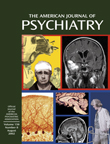Postnatal Depression in India
To the Editor: I read with great interest the article by Vikram Patel, M.R.C.Psych., Ph.D., and colleagues (1). Although the study was well conducted and well written, there is an alternative way of interpreting its results and looking at the problem. Dr. Patel and colleagues concluded, “The study confirms our hypothesis that gender-based factors are important determinants of postnatal depression” (p. 46). They also stated, “It is plausible that the family’s collective joy at the arrival of a male infant helps support the mother and negates the risk associated with other stressors” (p. 46).
First, I agree with Dr. Patel and colleagues that biological, social, and psychological factors are important determinants of postnatal depression. However, caution is needed when equating self-report data with a clinical diagnosis of depression. Screening instruments do not provide a clinical diagnosis of depression. Although the Konkani-language version of the Edinburgh Postnatal Depression Scale has been validated in the local study population (2), a cutoff score of 11 or 12 on the scale may overestimate postnatal depression (3). Use of a higher postnatal threshold could have provided a best estimate of the prevalence of depression. Some mothers scoring above the threshold will not have a depressive illness, and some below the threshold will.
Second, maternal education was found to be a significant protective factor against postnatal depression (relative risk=0.5; χ2=4.4, df=12, p=0.03) (1, p. 45) and may have explained the precise mechanism of how poverty-related variables (low level of education, economic deprivation, and gender inequality that can lead to violence) and the infant’s gender interacted differentially according to the gender of the infant. Limited intellectual resources for coping result in few psychological resources for developing a sense of control and mastery over the unpredictability of events (4). Therefore, mothers with a low level of education and limited intellectual resources for coping bear the weight of moral responsibility as well, akin to guilt, which increases their psychological distress in this cultural setting, in which the preference for male children is deeply rooted. It is plausible that the arrival of a male infant negates this guilt; hence, there is a decrease in the probable cases of postnatal depression.
Finally, we appreciate the authors’ efforts if their intention was to emphasize the fact that the needs of these mothers are primarily for appropriate social support of one sort or another. The ill-defined majority of psychologically distressed mothers are often left to muddle through well-meant social interventions orchestrated by vaguely skilled, empathic general practitioners, who are strongly versed in a medical style of response.
1. Patel V, Rodrigues M, DeSouza N: Gender, poverty, and postnatal depression: a study of mothers in Goa, India. Am J Psychiatry 2002; 159:43-47Link, Google Scholar
2. Patel V, Pereira J, Mann AH: Somatic and psychological models of common mental disorder in primary care in India. Psychol Med 1998; 28:135-143Crossref, Medline, Google Scholar
3. Murray D, Cox JL: Screening for depression during pregnancy with the Edinburgh Depression Scale. J Reproduction Infant Psychol 1990; 8:99-107Crossref, Google Scholar
4. Miller B, Campbell RT, Farran CJ, Kaufman JE, Davis L: Race, control, mastery, and caregiver distress. J Gerontol B Psychol Sci Soc Sci 1995; 50:S374-S382Google Scholar



